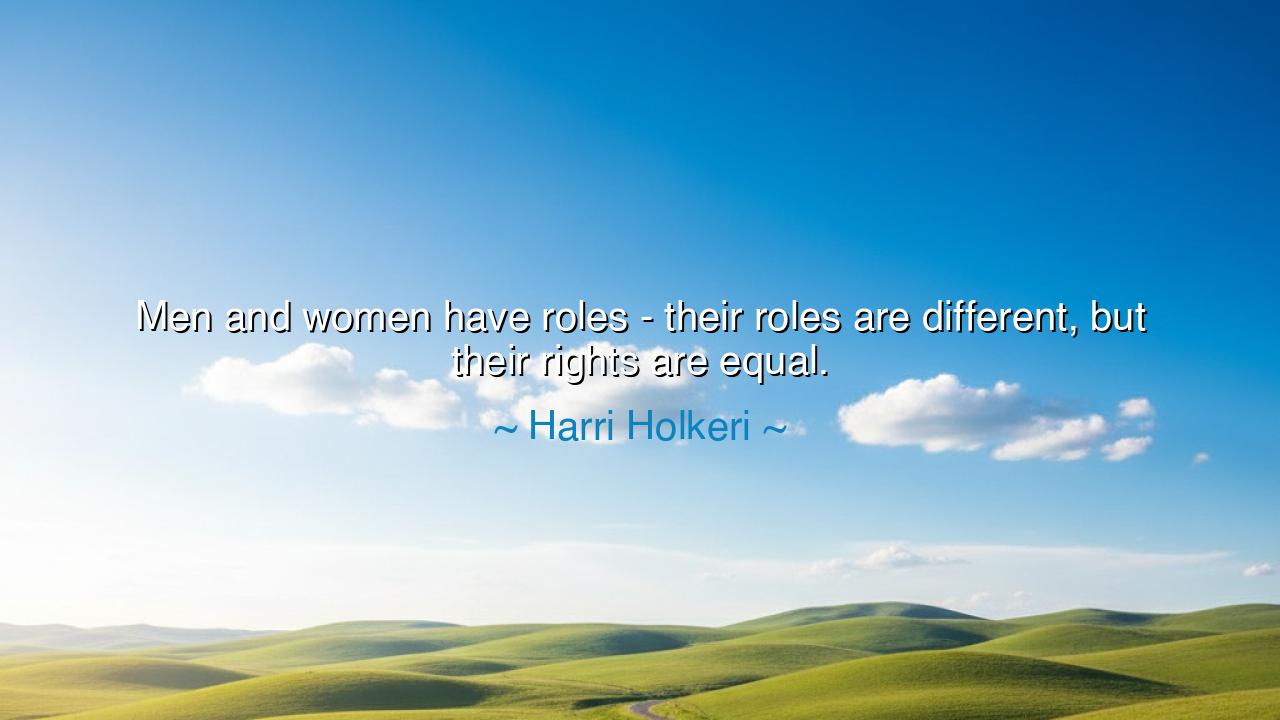
Men and women have roles - their roles are different, but their






Hear now, O children of wisdom, the words of Harri Holkeri, statesman and peacemaker, who declared: “Men and women have roles—their roles are different, but their rights are equal.” This utterance is like a double-edged sword, cutting through confusion and imbalance, reminding us that harmony lies not in sameness, but in justice. For he who spoke these words was no idle dreamer, but one who labored for peace in the lands of division, seeking a world where equality reigns without erasing the beauty of difference.
The ancients, too, understood this truth in glimpses. In the myths of Greece, the gods and goddesses bore differing powers: Zeus with thunder, Athena with wisdom, Demeter with harvest, Hermes with swift speech. Their roles were varied, but each was honored as divine. So too in the household and the polis, men and women took upon themselves differing labors, yet the worth of the human soul was not to be measured in labor alone, but in the dignity of its being. Holkeri’s words awaken this ancient truth: that equality does not demand sameness, but recognition of equal rights.
Consider the tale of Rosa Parks, a woman whose simple refusal to surrender her seat in Montgomery became the spark for a great fire of justice. She did not hold the sword of a warrior nor the authority of a ruler, but her strength lay in defiance born of righteousness. By her action, she declared that the rights of women are no less than those of men, the rights of the oppressed no less than those of the powerful. Her story echoes Holkeri’s wisdom: whatever the role, the dignity of equality must not be denied.
The danger of forgetting this teaching is great. For when roles are mistaken as measures of worth, injustice grows like a weed in the garden of society. One might say, “This task belongs to man, this to woman,” but if from that division arises chains, then harmony is lost, and oppression takes root. True order is not found in hierarchy, but in balance: in rights upheld equally, even as labors differ. To confuse difference with inequality is to sow discord that can destroy nations.
Yet there is also heroism in embracing difference without fear. For just as the body needs both the strength of the arm and the vision of the eye, so too does society need the balance of varied roles. One plants, another harvests; one speaks, another listens; one leads, another nurtures. In this diversity lies wholeness. But only when all are granted equal rights can this wholeness flourish. To deny equal dignity is to cripple the body of humanity itself.
Therefore, O listener, the lesson is clear: Honor the differences in role, but fight for the equality of rights. Let no man think himself greater by labor, nor any woman lesser by station. For the soul knows no gender, and justice knows no hierarchy. In the eyes of truth, all are equal, though their paths may diverge.
Practical action lies before you. In your dealings, look not only at what men or women do, but how they are treated. Speak when you see imbalance, defend the dignity of those whose rights are denied, and honor the contributions of every person, whatever their role. Let your household, your workplace, your community become a place where different gifts are celebrated, and equal rights are upheld.
So remember the teaching of Harri Holkeri: men and women may carry different burdens, different duties, and different songs—but their rights must be equal, for without equality, no society can know peace, and without balance, no people can truly flourish.






AAdministratorAdministrator
Welcome, honored guests. Please leave a comment, we will respond soon